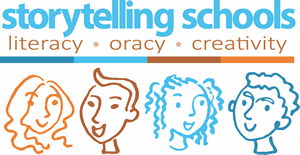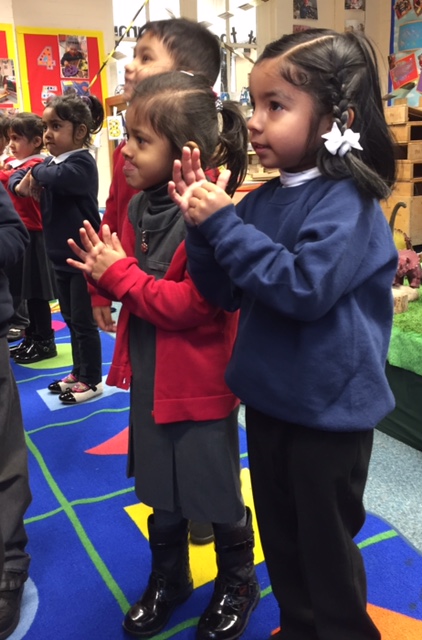Storytelling School Achieves Outstanding

Children listening to a story
Congratulations to the staff at Mayflower Primary School in Poplar, Tower Hamlets, for achieving outstanding status in their recent OFSTED inspection.
STS interviewed Dee Bleach, Headteacher about the school’s achievement.
“Our contact with the Storytelling Schools approach began in 2009 when Michael Rosen and Chris Smith made a presentation at a nearby school. Two pupils from Pegasus School in Oxford came down and told us a story: they delivered it with such fluency, enthusiasm and obvious enjoyment, that I immediately felt this would be right for our pupils.
At that time our attainment levels in English were well below national average: we needed something to engage and inspire our pupils to get more enthusiastic about writing. Helping them find their voice, like the Pegasus storytellers, seemed like a great place to start. I liked the sound of the approach: it built on talk for writing and I liked the creatively and fluency of this approach which I thought would appeal more to our staff and pupils.
Chris Smith from Storytelling Schools, then provided a series of twilight trainings to our staff over the next two years, drip feeding the 7 elements of the method (telling, deepening, shared writing, innovation, invention and non-fiction.)
It was good to go step by step, with Chris coming in and checking in on progress so that we could receive bespoke trainings adapted to our needs. Also, later, a second trainer, Nanette Stormont was important as a mentor and planner for our teachers, especially for upper KS2 where she showed them how to use storytelling to teach excellent writing for this age group.
We integrated storytelling into our curriculum so that stories were always told at the beginning of each half term as the learning springboard.
Levels of writing began to improve immediately and continued to climb over the next few years, as the storytelling method became core to how we taught. Our teaching teams liked it, not just because they saw the results in the quantity and quality of writing, but also because they felt themselves developing as confident and inspiring storytellers.
The Storytelling Schools method proved a useful system for developing as a teacher. Staff got used to the standard teaching sequence (tell, deepen, write, innovate, invent) and became better and better at adapting it to their pupil’s needs. It is an inclusive approach that supports all learners. Also, with time, the children themselves understand how the process of storytelling supports their learning, enabling progress in peer and self assessment and the development of a visible learning culture.
Today the pupils who started storytelling in reception back in 2009 are now in year 6. Over their time in the school they have learned to tell at least 40 stories by heart: for them it is just a normal and natural way of learning.
Storytelling has also helped our engagement with parents: the children take their story maps home for retelling and practicing and we found that many parents were both delighted and amazed by the skills of their children.
The benefits have spread beyond our individual school. Through a project funded by SHINE, 9 schools in the Poplar Partnership have adopted the method, and we now host and run training for other schools. Many teachers have visited and seen the method in practice before adopting storytelling themselves.
For me, achieving outstanding status has been about supporting teachers and their creativity: the storytelling method has been a great way to support and develop creative teaching, building a confident and empowered team of educators, on a solid base of learning theory and practice. ”
Here are some quotes from the report:
“Pupils’ learning is outstanding … All adults have high expectations and use their expertise to get the most from pupils. Teachers apply their subject knowledge well to plan interesting, exciting and challenging work. They bring learning to life by choosing topics that motivate pupils and by linking these topics to the range of subjects taught over the year. Pupils’ excitement is often palpable.
“Teachers .. have a clear understanding of where pupils are with their learning and use this to set challenging work that stretches their thinking. Teachers identify gaps in pupils’ learning and quickly ensure that these are filled.
“Teachers plan and prepare their lessons thoroughly and with care. They know their pupils well and set work that motivates them and supports those who may be struggling.
“Teachers work in partnership with other teachers and support staff most effectively to plan lessons, and discuss and share ideas. This creates a very positive climate for learning right across the school. Teachers have a clear focus on pupils’ progress and speak eloquently of the way the school uses research to develop and refine its approaches to teaching and learning. Teachers are thoughtful and reflective, constantly developing and improving their practice. This ensures that pupils get high-quality teaching that is tailored closely to their needs and abilities. ”

